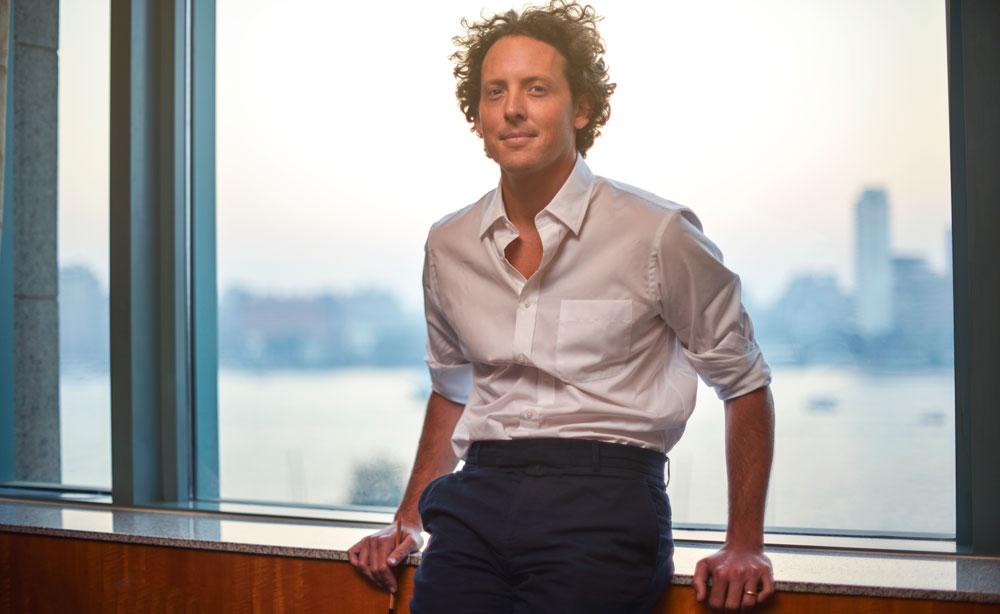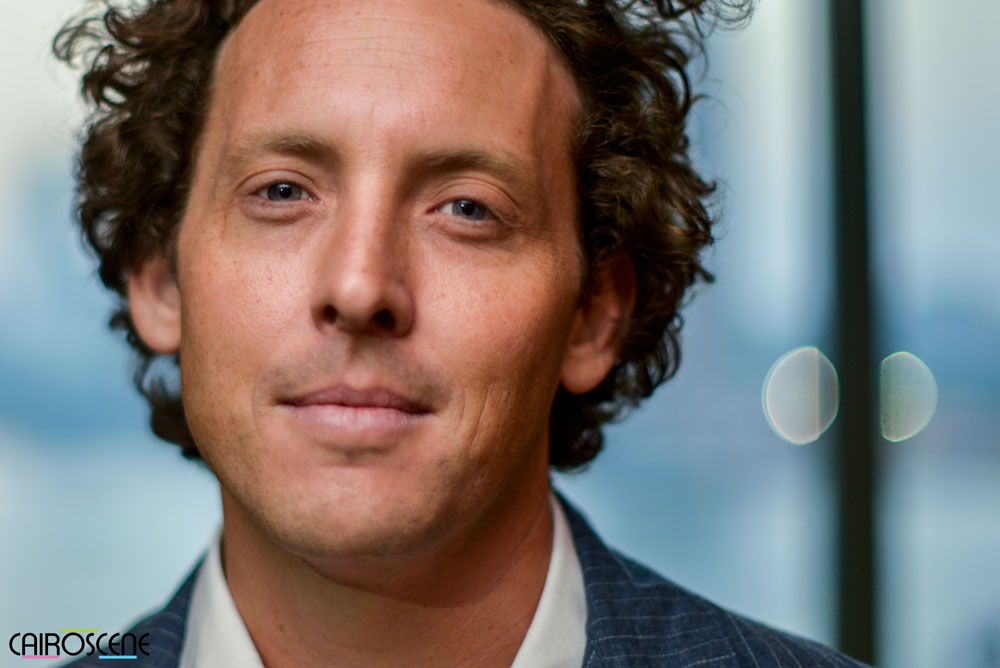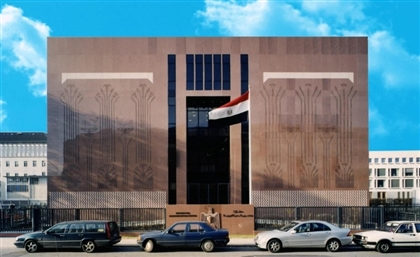US Secretary of State's Senior Advisor on Global Cities Ian Klaus: Why Cairo Matters
US Secretary of State John Kerry's Senior Advisor on Global Cities, Ian Klaus, weighs in on Cairo's many urban qualities, the challenges facing cities today, and the innovative ways people are making their cities great.

Industrious masses rushing through crowded sidewalks, fuelled by copious amounts of caffeine, ready to take on the world. Traffic rows, dilapidated cars, flamboyant dressers, loud noises, bright lights visible light years in altitude, centuries-old structures, and a million strange faces all caught in the interminable dance of life, united in the daily grind, very much aware of the void yet finding comfort in their togetherness – that is how I have come to identify a city.
It is this togetherness that often comes under attack by those who seek to disturb the harmony of this collective synchronised dance that transcends our self-imposed boundaries and unites all of humanity no matter their pursuits. It is this togetherness that is often compromised by our misinformed practices for although we like to think we are all in this together, some of us are in it alone.
In the age of globalisation, cities no longer exist as independent geographic units separate from one another but rather as a continuum of economic nodes and urban hubs that eventually connect the global economic network – hence the term global cities.
Many cities in the developing world, however, do not rise to the stature of global cities due largely to lack of political will and poor governance, Cairo, of course, being a shining example. Despite being one of the world's oldest cities and a mighty metropolis in its own right, the city of a thousand minarets is stumbling in its path towards sustainable and inclusive urbanisation.
With 54% of the world's population concentrated in urban areas and a projected growth of 2.5 billion people in 2050, according to a UN report, the commonalities between cities are more than ever – and that includes challenges ranging from transportation to density to climate change and beyond.
And so the challenges facing Egyptian cities are shared by many in the world and this is precisely why Cairo matters to Ian Klaus. During a three-day visit to the Egyptian capital, the US Secretary of State's Senior Advisor on Global Cities has met with representatives from Egypt's Ministry of Foreign Affairs to discuss the upcoming United Nations Conference on Housing and Sustainable Urban Development Habitat III set to take place in Quito, Ecuador from October 17th through the 20th. Mr. Klaus also held discussions focused on community development, transportation, urban technology and innovation, and energy and environment with civil society organizations and other actors, as well as ways to stimulate sustainable and inclusive growth in Egyptian cities with members of the private sector, academics, and other non-state actors.
For all his academic accolades – a Rhodes Scholar and Harvard PhD – Klaus is really a devout romantic. Being my brusque millennial self, I told him his words were "American" and "diplomatic," hoping it sounded like a compliment, to which he said, "Here, this isn't diplomatic, but I think it's worth saying, what does it take to know a city?" He asked rhetorically before effusing, "Every day you spend in a city, you realize that you know it less; they're magnificent complex places that have to be approached with a profound humility and an appreciation for things that make you uncomfortable, but, they're also an incredible amount of fun and so I think it's a never-ending surprise and adventure to live in one of these great cities of the world." I was sold. And here is why.
Why do urban areas have more inequality?
That's a very complicated question, I think that there are theses written on the explanation of why, but I think the identification of that phenomenon – it clearly does exist in lots of cities around the world, and there's a lot of important cities and increasing trends – is something that we all have to grapple with. And so, that means, depending on where you are in the world, the question of making sure that cities are accessible to all, and that people don't get pushed out of them or in other cities around the world, that the economic opportunities within them are expanding and available. That includes also all sorts of super geeky urban stuff like transportation and what is the relation between transportation, education, and opportunities and transportation and economic opportunity because you have to travel hours and hours to get to work and, of course, that has high social cost. So that's an incredibly complicated question in which a lot of things converge and one that we all have to focus on.
Why is urbanisation so important to the US and where does it fit in US foreign policy?
Urbanisation is a global phenomenon in the US, the State Department; we're the outward-looking body, and we have a domestic agency that's thinking about what's going within American cities, but it's of course true that many of the trends that are taking place in our own cities also occur elsewhere in the world and that gets to the question of why we care, and the question there is try to find a challenge that we all agree upon as crucial, and goals that most of the countries in the world feel that we have to work on together. […] Climate change being the classic example, but the degree to which cities can be actors that take steps for themselves – and we have seen this – is really crucial in terms of making progress in relation to carbon emissions within cities where most carbon emissions, of course, come from.
How is the State Department working to advance that?
The State Department is a very dynamic organisation, in fact. In the course of the last 20 years there has been many observers who have noted the fusion of power – we can debate whether it's true or not, but you certainly start to see an increase in the importance of non-state actors in the world, [it] has been noted by many as increasing. And that includes population groups within cities, that includes the private sector, that includes civil society, and I think it's very important, as you try to counter some of these global challenges, to recognize that those actors have a role to play. And so the unit of a city, it's great if you have a strong mayor or a strong governor that can also connect with inner cities, and they have the ability to do things – that is crucial and that can help make progress. And so to deny them and pretend like they don't exist to only have conversations about what capitals can do, is to miss sites of power that can make progress and tend to be inclined to be active and be progressive when it comes to a lot of issues. You've said that incorporating civil society in the framework of urbanisation is crucial? How well do you think we're doing in that department?
You've said that incorporating civil society in the framework of urbanisation is crucial? How well do you think we're doing in that department?
I would never begin to assess how Egypt is doing, I can only tell you what I've seen in the conversations I've had – it'd be arrogant to do anything otherwise – but I've had a remarkable set of discussions in the last couple of days that have ranged from everything; in the space of innovation when it comes to transportation, to cultural heritage preservation, to community engagement and community rooftop gardening. The range of issues that people tend to be working out locally or at an urban level is really amazing, and the energy behind it is amazing, and the question of how that extends to Alexandria, other cities, Port Said, etc. – I really couldn't speak to that, but this is world class stuff. Cairo matters because it's one of the great cities and the greatest urban cities in the world; what's happening in Cairo right now matters because some of the things that I heard about and some of the things that I saw could be relevant in Istanbul, say the cultural heritage preservation, some of the transportation issues can be relevant in Delhi, and people there need to know too and that exchange needs to happen. Facilitating that sort of exchange and conversation and thinking globally about what is happening locally is part of our business.
Do you think Egyptian cities have paid the ultimate price for poor governance?
One of the interesting things about Cairo is that urbanists today are very fond of density – when you talk to people in Cairo, they complain about the density. Urbanists are very fond of planning and I think there's a lot of urban planning that goes on here, but in the sort of inverse, people, sometimes, I hear, complain that there is too much planning in that they're just building up more and more and more. And so, the density challenge and the threshold for density, where you cross it, I think is one of the really interesting conversations that are happening – I heard both sides when I was here; people who are very fond of the density, and then people who work in traffic issues that think of the big issue, but in that Cairo is not unique. In the traffic dilemma, in the energy efficiency issues, in the water issues, you know, every city is nuanced and the government structure in which it works is nuanced, but simultaneously, a lot of people who work in the urban trades feel like there actually is something of a recipe at these issues that we care about. In particular, gender safety, being a big one that I understand comes up quite a bit as it comes to transportation in this city. I don't know if poor governance is the explanation there because it's a similar set of issues in mega cities around the world – that's why the conversation between the cities is, in my mind, so important. People all over the world are trying to figure out interesting ways to move people around cities, like the most efficient way to move people around cities, multi motorway; how do I get from a metro to a bus to an Uber to a bicycle? And that's a conversation that is happening here, and that's a conversation that's happening in cities all over the world. None of those practices belong to any given city or country, no one has a copyright on the innovative ways to get people around very dense and complex urban [areas], and the more we share the solutions, the better we all are off for it. Why are cities more vulnerable to terror attacks?
Why are cities more vulnerable to terror attacks?
If you look at trends for types of attacks, or sources for recruitment, makes me believe both occur in urban cities, and this is why something like community engagement and public spaces are so crucial because certain types of attacks strike at the core of what a city is – which is a shared space. […] It is because they're multicultural places and that makes some people uncomfortable, but because they also have hubs of economic propensity and growth, and undermining an economy has return to some people there are other reasons that speak to the qualities of cities.
Can you tell me more about Habitat III?
Every 20 years, a UN-wide conference on urbanisation in Quito, October 17th to 20th, 30 to 40 thousand people. There are a lot of things that are important about Habitat III, but one of the really important things to the US government is that the approach to urbanisation always includes conversations into the bottom up approach and dialogue. So, we took a negotiating position that emphasises the importance of data – data is crucial to making cities work, including Cairo. Access to finance is a crucial issue for cities that we emphasise, and a lot of cities in the developing world, the vast majority of them, don't have access to finance. Sustainability, inclusivity, those are all important issues for the US government, but most importantly, two things: one, that cities matter and this is the UN saying so, and this is all the member states saying so, and second, if they matter and if we have to do what we can to make them sustainable and inclusive, what's that process? National governments surely have an important role to play, infrastructure being a classic example, but so do the people who live in those cities and because what those people are doing is important to people in other cities, even if they don't know it. And it does often produce the best results. And so for us, Habitat III is in part a celebration of the best practices that have been developed by urban residents all over the world to make their cities better and that we need to emphasise and share.
Do you think urbanisation can encourage cultural integration?
Cities have long been cosmopolitan places where people learn to live side by side and actually, it's that tradition and history and practice that often comes under attack, but there's something else there that's important which is – cities are small communities where people know each other but they're also anonymous places. One of the fascinating things about cities as anonymous places is that they have particularly coexisted as multicultural, cosmopolitan, and diverse and it works. But it's the social capital that makes it work – the relationship between people even if they're strangers. What can we do to encourage that? Something like cultural heritage and public spaces is one answer, but another is – and this gets to the government part – encouraging people to engage in social exchange on social media about their urban space or about governance in urban space, or about waste management, or about potholes – these things build trust between individuals, they build trust between governments and individuals. […]
What stood out to you here in Cairo?
The Cairo design community seems to be a very energetic one and a very new one, and there's no underestimating those designers [...] it can be style or it can be academic or theoretical, but the simple steps that great design people can take to help make a city safe or more inclusive. You decide your goal, greener for certain, more amenable to people being outside. I mean, we don't even have to talk about best practices, but beyond, I suspect you could go and find some of the really, really exciting design folks from this town, give them a space, I mean that's great for cities. […] They need to be part of these conversations, there are certain things that we think of – integration of refugees and all of a sudden you're in Berlin, and all of a sudden these design and architecture communities thinking about it. Great! That's perfect, they have to be, because they're innovating ways that ministries or departments in a city might not be able to think of.
Photography by Ahmed Najeeb.
- Previous Article RSM World Day Comes to Moez Street
- Next Article 7 Weird Things White People Used Mummies For
























